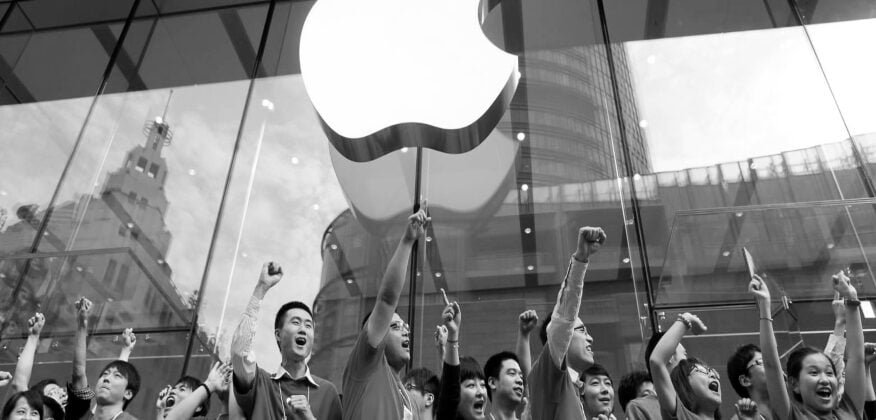Apple, the world’s most valuable company, owes much of its success to the close relationship it has cultivated with China. However, this partnership has raised concerns about Apple’s reliance on the Chinese market and the potential implications for the company’s future. While Apple continues to make great products, the influence of its CEO Tim Cook and the company’s operations in China have played a significant role in its share price growth.
But China has used its position to force its political will upon Apple and, through Apple, upon the U.S. and the rest of the world. As the Financial Times said, “Apple is a Chinese Company.”
One notable incident occurred when Apple banned the HKmap.live app from its App Store. Initially approved, the app allowed protesters in Hong Kong to track police movements. However, after local authorities complained that it was being used to ambush police, Apple decided to remove it. This move raised concerns about the company’s willingness to comply with the Chinese government’s demands.
In another instance, Apple limited file sharing on iPhones in China following the use of AirDrop by anti-government protesters to spread leaflets critical of the Chinese Communist Party (CCP). This decision was partially inspired by a Beijing man who hung banners seeking the removal of Xi Jinping, the General Secretary of the CCP.
Apple’s commitment to user privacy took a hit in China as well. The company introduced a new privacy feature designed to obscure web browsing data from internet service providers and advertisers. However, this feature was not made available in China, raising questions about Apple’s willingness to compromise on privacy to maintain a strong presence in the Chinese market.
The Chinese App Store also saw tens of thousands of apps disappear. Foreign news outlets, gay dating services, encrypted messaging apps, tools for organizing pro-democracy protests, and even apps related to the Dalai Lama were among those blocked. These actions, viewed as catering to the Chinese government’s censorship demands, drew criticism from freedom of speech and expression advocates.
While Apple has assured Chinese users that their data is safe, concerns have been raised about Guiyang’s data center. Chinese state employees manage the center, and the digital keys required to access the systems are stored within the data centers themselves, raising concerns about potential government surveillance and control.
A series of incidents further highlight Apple’s struggles with censorship in China. Removing the Quartz news app from the App Store in China over its coverage of Hong Kong, censoring the Taiwan flag emoji, and censoring songs referencing the Tiananmen massacre and democracy on Apple Music are a few examples. Additionally, removing VPN apps and the New York Times apps from the Chinese App Store underscored Apple’s compliance with the Chinese government’s demands.
These incidents demonstrate the delicate balance Apple must maintain between its business interests in China and its commitment to principles such as freedom of speech and privacy. As the company continues to navigate the Chinese market, it faces ongoing scrutiny and challenges in upholding its values while avoiding potential backlash from the Chinese government.
During a visit to China, Tim Cook praised Apple’s “symbiotic” relationship with the country, highlighting how the company and China have grown together. Over the past 20 years, Cook has embedded Apple deeper into China, culminating in a secretive 2016 agreement to invest $275 billion in the country’s economy, workforce, and technological capabilities. As a result, Apple’s revenue from China accounts for almost a fifth of its total revenue, with operating profits in greater China exceeding $31.2 billion in 2022.
Recognizing the risks associated with its heavy dependence on China, Apple has gradually diversified its production and supply chain to reduce its reliance on a single country. The company has started moving production of iPhones to India, AirPods to Vietnam, and Macs to Malaysia and Ireland and has assembled teams to shift its supply chain. However, these efforts face challenges, as even small shifts may invite retaliation from Chinese authorities, potentially turning Chinese consumers against Apple products. Exiting China entirely seems unlikely and could significantly affect Apple’s success.
Investing in Apple has become a geopolitical bet due to the company’s deep ties with China. The Chinese Communist Party wields significant leverage over Apple through its control of manufacturing facilities, access to the Chinese market, and dominance over Apple’s global supply chain. As tensions between China and the US persist, Apple’s reliance on China poses risks to the company’s future, mainly if China were to restrict its market access or disrupt its supply chain.
In short, China can beat Apple to a pulp at its leisure and has no problem extorting it for political purposes.
The world’s largest company is owned by the Chinese Communist Party.
This article originally appeared on Anti-Communist Zone: Extortion and Coercion: Does China Own Apple?











